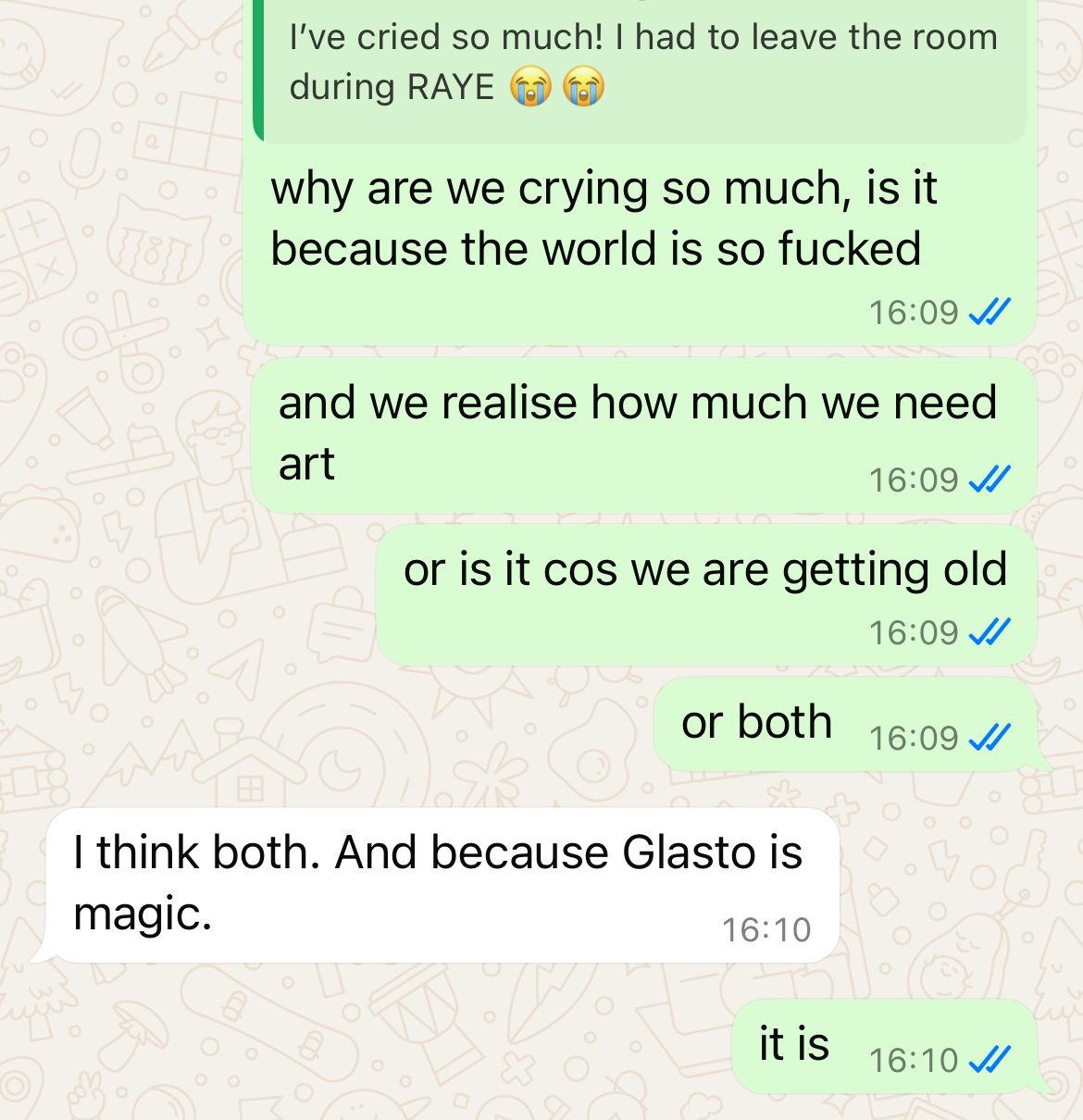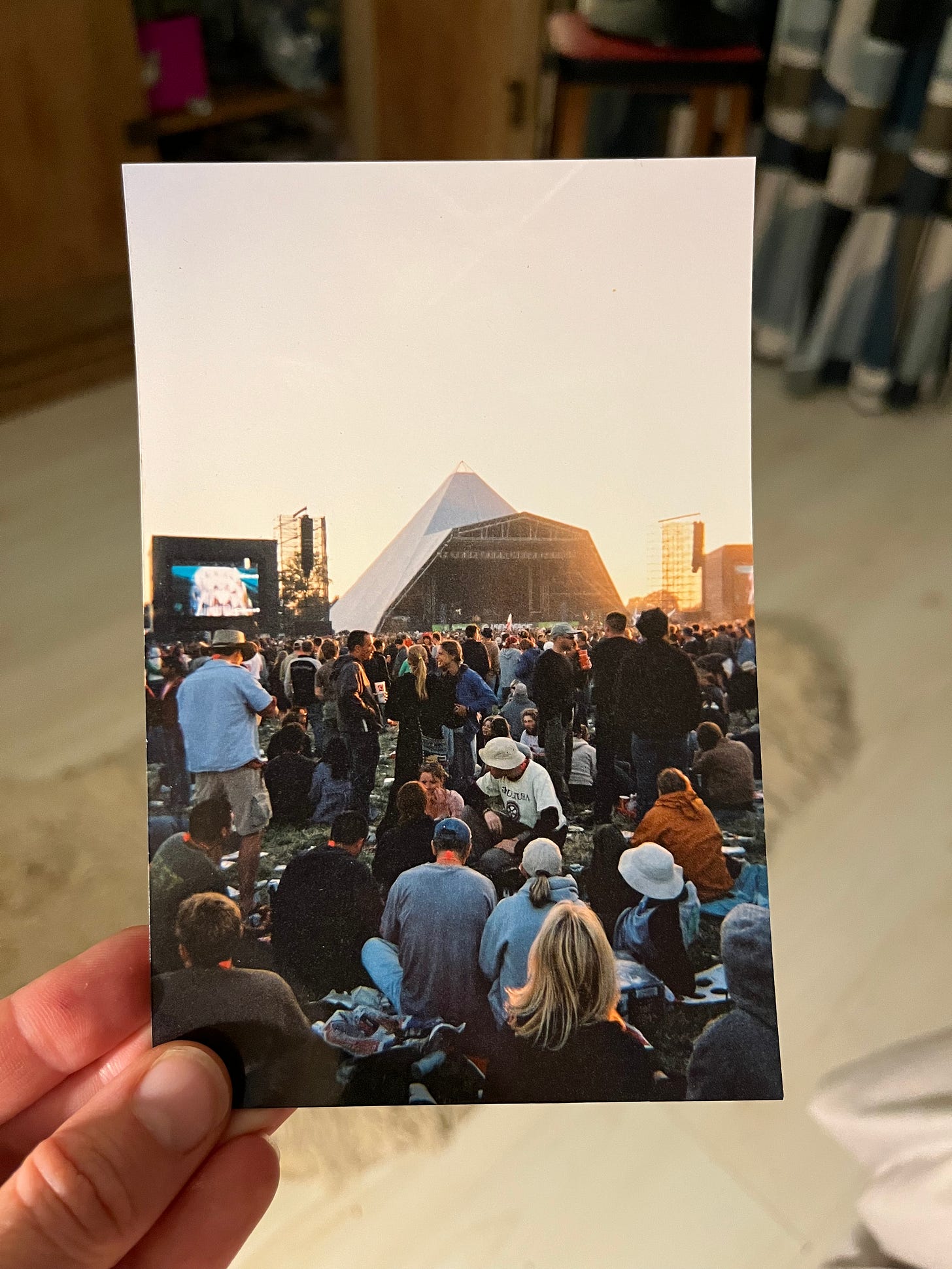Hello friends, here’s a post after a busy few weeks elsewhere but a quiet time on here. My next seasonal circle is on Tuesday 29 July at 8pm - join us?
On the Glastonbury weekend I love staying in and watching the live broadcast, mourning the fact that I’m not in a field in Somerset. My husband sits beside me on the sofa, very much not grieving the fact that he’ll be sleeping in a bed not a tent tonight, tolerating the times I jump up for a living room dance, drink one more Saturday night glass of wine than usual and cry quietly at some devastatingly good performance.
This year I found the event more emotional to watch than ever, perhaps because of the perceived distance from what Glastonbury stands for and what’s happening in the world right now. Even in the early 2000s, the real field in Somerset to me felt like some kind of utopian departure from normal life, a radical space of hedonism and joy, a place of unparalleled warmth between strangers and even stranger hours kept, walking back from the dance tent as dawn rays pricked up from the horizon.
There’s also the nostalgia - it’s been twenty years and my forty-something life is of course so different to my twenty-something life, so - predictably - less carefree. This happens, of course, the extra responsibilities, the creation of startling new people who need us, and none of it is bad. But something about longing feels like it’s asking to be felt, and I try and let myself feel, not dismiss it.
The tug in the heart and gut of time passing is echoed by a different kind of grief, one identified in a recent piece by
, What we expected and didn't receive. As I woke hot and fretful in the latest heatwave, I felt wracked with the kind of bottomless anxiety that can only come at night, worrying about what kind of earth my children - our children - will inhabit, with the lost normalities and predictable markers of life’s stages that we can no longer count on - school, university, travel, work, partnership, a family of their own.And how are we reckoning with the loss, these interconnected crises and the unpredictable way they will unfold in our own and our children’s lifetimes? In our own individual ways, some of us in denial as we turn away, some of us coming together to process it. In the weeks after Glastonbury I always find myself dancing more, alone at home, in the space that’s “mine” in the early hours or when the children are in bed: my little conservatory, where I have a desk and space to move among the children’s toys and books. Much of this movement is joyful, inspired by the amazing performances I’ve enjoyed this year (Ezra Collective and Self Esteem in particular got my feet dancing). And sometimes it feels very heavy and grief-filled, my body needing to dispel the ephemera it’s holding in response to witnessing world events from afar.
(The video below was from early morning on the day of my wedding in 2019. Moving lots of jitters through, trying to relax into taking up space and giving myself permission to be the centre of attention for the day)
I’m not suggesting that everyone needs a dance practice to help process their feelings, but I know that there is much missing in the way we are processing (or not). I was considering that idea this week as I heard that the one and only Joanna Macy, ecological activist, Buddhist scholar, writer and deep ecology/systems theorists has entered hospice care in her 96th year. I read a wonderful piece about Joanna from
this week which illustrates her focus on turning towards, not away from our despair and sadness for the world:“One of the things Joanna Macy says is that until you access your grief, your ability to act is likely to be blocked. The fear of grief—really of the pain and sadness and powerlessness that fuel it—makes it almost impossible to harness the energy necessary to resist the power structures that rationalize and enforce violence. If even coming into brief contact with others’ suffering is too much to bear, the person will do everything in their power to avoid their fear and grief. Their energy will stay locked up in the effort to compartmentalize and deny what they know … What is needed are practices that help people feel how devastated they are that others are suffering … And once those feelings emerge in their vastness, to help people become capacious enough to hold the grief and the hope and possibility for something entirely different to emerge. Once they have that, action will follow, because it will be obvious to that person what they must do. And the kicker: they must act from a place of radical uncertainty. No guarantees. Just the knife edge of what she calls ‘active hope.’”
I read Joanna’s Active Hope a few years ago and felt floored by its conception of hope. So, hang on: hope doesn’t need to be connected to a likelihood of something occurring? Instead we’re allowed - indeed, we must - keep alive a clear vision of how things could be better, even in the absence of its probability.
A few weeks ago I was talking to a friend about how the online group I am planning might work. She was telling me about something she is engaging in right now: a short, non-religious prayer practice. In this prayer she imagines that Gaza is free. She imagines that children are playing in the streets and people are sitting outside, playing games and chatting.
In the weeks since she told me this, I’ve kept thinking about it, and my imagination has filled in some gaps from what she spoke of. In Gaza the water by the harbourside sparkles. People are fishing, boats are coming in. The dust is kicked up in the heat of the afternoon sun. Birds are wheedling in the sky, there is a market, fruit, laughter. I can see the expressions on children’s faces, and there’s ease, there’s joy.
It’s easy to dismiss a vision of the future as idle and idealistic, time-wasting and unrooted in reality. It’s a colloquial criticism: mate, you’re dreaming. But this action of dreaming - this aspect of active hope - is a necessary, missing component in our fear, our despair, one I know Joanna Macy would applaud. Our hopeful visions keep us from the numbness and inaction of despair and actually makes positive change more probable, not less. Perhaps it means we can mitigate the worst of an occurrence that we cannot control. Perhaps it means one moment of kindness in a sea of chaos. (Can we say this moment does not matter, is not worth something? We cannot).
Grief/despair and hope/joy are intimately connected in the way that all opposites are, where one enables us to perceive the other in its fullness. Joanna Macy says: let us acknowledge what we’ve lost, where we despair. And let us imagine a better future, opening the door to potential change - to us feeling that we can, that we must act. (Let’s remember the 25% tipping point rule. Let’s remember that people saying no more is how a lot of change has occurred in history.)
What is needed are practices that help people feel how devastated they are that others are suffering. If we know what to do with our grief then that might help us know what to do with our joy. What we’re frequently missing are practices that are collective and that take into account that we have bodies that hold profound sadness, fear and joy. Much of the time our position of witness is absorbing the world’s heaviness and trying to work through it alone, crying in our homes because of another video of a lost, bombed, broken child.
I’d love to know what helps you reckon with all of this. Is there a space you can share all of this, or a practice? Is it collective or solitary? Does it centre the body or the mind? My aim is to create a circle with some practices to help us collectively reckon with all of this, something I’m yearning for too. I’m going to take my time to think it over and planning for something in the early autumn. There’s much I don’t know yet but I’m ready to start to learn how to do it, together.
Things I’ve enjoyed/things to watch out for
A few things that have caught my eye in the last few weeks:
If you missed Kae Tempest at Glastonbury, I’d highly recommend watching the set (if you’re in the UK and can watch BBC iplayer)! Near the end Kae does the most amazing summary of why Glastonbury, in all its sacred and commercial and gentle and hedonistic expressions, is so special.
Pleasure Activism by adrienne maree brown has been on my bedside (for maybe 2 years?!) and I’m finally digging in. She recognising the somatic experience of pleasure as fuel for our actions, big and small
The real reason I am childless, by
. Would I have kids if I was deciding whether to have children now and not 10 year ago? I’ve been pondering this unanswerable question in recent weeks. Some fascinating insights here on how the place we’re in informs this central question, from one of my favourite thinkersChoose comfort, ditch boring and prioritise pleasure – how to find the perfect beach read - I really enjoyed this Guardian piece by
. The book-snobbery I absorbed from various places has held me back, I think, from reading for pleasure, in a similar way to my former more serious approach to music (before I started to embrace all the pop I want in my life). I’ve got some non-fiction lined up for my holiday but I’m also going to the library before I go to load up on Marian Keyes and Lianne Moriarty (both brilliant writers, I’ll add!)We’re watching Hacks on Now TV - a young LA TV writer is sent to work with a veteran stand up comedian played impeccably by Jean Smart. So funny, so good, and there’s four series to catch up on if you’ve never heard of it
A very special event coming up designed to do exactly the work spoken of here - a vigil for these times, hosted by
and . “An online evening of reflection, poetry, music and art making offered as a gesture of solidarity, a coming together in a way that feels sacred and conscious and kind.” No doubt this will be wonderful and the kind of balm we need right now.







Thanks for sharing. I love dancing and music. During Covid, myself and a friend launched an online disco for family and friends. Each was themed, people could submit tunes they wanted to include and we danced in our living room for hours, having the best party with people from all round the world. It gave us movement, fun, healing and also connection at a time of restrictions and contraction.